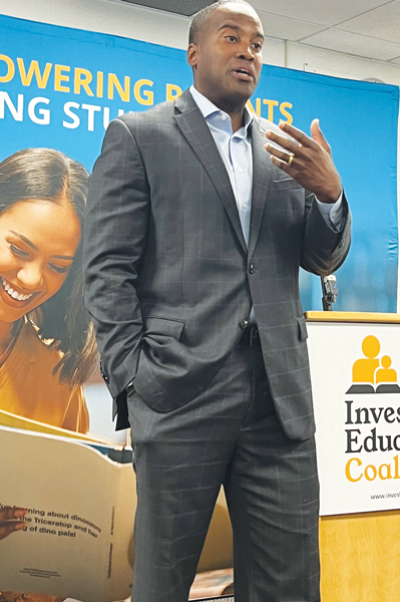
U.S. Rep. John James, R-Shelby Township, said the Educational Choice for Children Act, if passed, would provide $10 billion in annual tax credits to taxpayers to fund textbooks, tuition, supplies and equipment for public, private, charter and homeschooled students.
Photo by Maria Allard
WARREN — As the new school year started, a press conference was held Aug. 28 at Regina High School where attendees discussed a federal bill that supporters say would give parents more choices for their children’s education.
Bill No. 531, titled the Educational Choice for Children Act or ECCA, was introduced last year and is currently under review in the Committee on Ways and Means.
Proponents of the bill include the Invest in Education Coalition, U.S. Rep. John James, R-Shelby Township, and Beth DeShone, executive director of the Great Lakes Education Project. All attended the press conference. Invest in Education Coalition advocates at the federal level for legislation so K-12 parents can choose the best school or education service for their children.
“The design of this bill is basically to ensure that families who face obstacles and barriers at the state level will be able to access the resources they need to broaden the array of educational options available to them,” said Greg Brock, a senior advisor with the Invest in Education Coalition.
Bill No. 531, if passed, will fund K-12 scholarships through private donations that cover essential elements including tuition, tutoring and special needs services for public, private, charter and homeschooled children.
“This Educational Choice for Children Act is such an exciting opportunity to change the dynamic here in Michigan and provide families with supplemental support for their children’s education,” DeShone said. “This legislation would allow families to pay for things like tuition, tutoring and many other educational enrichments they desperately need to set their children on the best path for a successful future.”
If signed into federal law, the ECCA will allow individuals and corporations a new tax credit after 2023 for charitable contributions to tax-exempt organizations that provide scholarships to elementary and secondary school students. Beneficiaries must be members of a household with incomes not greater than 300% of the area median gross income and be eligible to enroll in a public elementary or secondary school.
According to the bill’s language, it excludes from the gross income of taxpayer dependents any scholarship amount for the elementary or secondary education expenses of eligible students. It also prohibits governmental control over scholarship granting organizations.
Anthony J. de Nicola, chairman of the Board of Invest in Education Coalition is a Michigan native who grew up in the Albion area and attended Catholic school, as did his three children. He would like to see other families have the same opportunity if they choose.
James, who co-sponsored the bill, said it would expand education freedom by providing $10 billion in annual tax credits made available to taxpayers to fund textbooks, tuition, supplies and equipment. Math and reading scores and student mental health are among his concerns.
“Mental health issues are skyrocketing because there’s hopelessness running rampant among generations who do not see a brighter future. A quality education is a basic civic right and we must fight to protect it,” said James, a graduate of Brother Rice High School in Bloomfield Hills. “I believe every child regardless of ZIP code or income should have the opportunity for success. I firmly believe that when you give parents a choice, you give children a chance. We have to return power to the people and get money down to the lowest level so teachers can do their jobs.”
Sterling Heights parent Michelle Smith has a first- and second-grader who attend a private Christian school, but it is a sacrifice financially.
“The most important thing we can do as parents is give our kids the best start. We have no issue necessarily with public schooling but for us what felt right was making sure our kids grew up in a faith-based environment,” she said. “This bill would be an excellent opportunity for other families who might not be able to afford to send their kid to a private school to have that opportunity.”
Eastpointe Community Schools Superintendent Christina Gibson, however, is not in favor of the ECCA and believes vouchers — whether as direct payments or tax credits — do not correlate with improved student outcomes.
“Vouchers primarily serve to save money for wealthier families, rather than addressing the broader needs of all students,” she said in a statement. “Studies have shown that voucher systems can have a more detrimental impact on student performance than significant disruptions like the COVID-19 pandemic or natural disasters such as Hurricane Katrina.”
Gibson has reached out to James’ office to express her concerns.
“Instead of competing for students, we should be united in advocating for our children by supporting communities and strengthening public education,” Gibson said. “What we know works is placing highly qualified, well-trained, and well-compensated teachers in front of students. The primary beneficiaries of voucher systems are often families who already have their children in private schools.”
 Publication select ▼
Publication select ▼

















